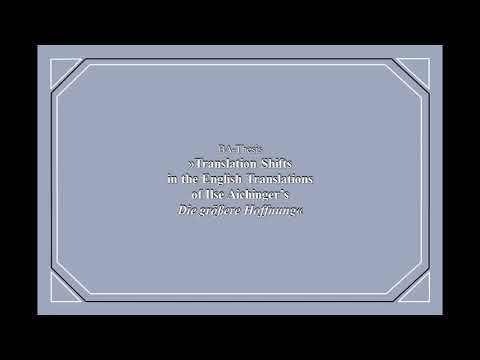 Speaker: Lena Mohr
Speaker: Lena Mohr
 Affiliation: RWTH Aachen University
Affiliation: RWTH Aachen University
Title: Translation Shifts in the English Translations of Ilse Aichinger’s Die größere Hoffnung
Abstract (long version below): The paper aims to answer whether translation shifts affect social and tempo-spatial deixis in the English translations of Ilse Aichinger’s novel Die größere Hoffnung (1948/60), Cornelia Schaeffer’s 1963 translation Herod’s Children and Geoff Wilkes’ 2016 retranslation The Greater Hope . Drawing from van Leuven-Zwart’s translation shift models and utilizing automated pos-tagging and stemming, the study explores social deixis, in the form of irreflexive and possessive pronouns and tempo-spatial deixis, in the form of distal-proximal adverbs and demonstratives.

 Long abstract
Long abstract
This paper aims to answer whether translation shifts affect social and tempo-spatial deixis in the English translations of Ilse Aichinger’s novel Die größere Hoffnung (1948/60), Cornelia Schaeffer’s 1963 translation Herod’s Children and Geoff Wilkes’ 2016 retranslation The Greater Hope . A shift occurs when the linguistic means between target and source differ formally but evoke a perceived equivalence in extralinguistic meaning (Catford 1965, 27 and 73). Since the functioning of narrative discourse ties back to linguistic construals, a shift study could provide a linguistic description of deviating textual compositions in terms of the novel’s narrative situation in the English translations. The translator’s voices intersperse with the narrator’s voice and can shape narrative techniques and thematic resonance (Jones 2019, 356).
Aichinger’s writing addresses linguistic and narrative inexpressibility after the Shoah (Fußl 2005, 266 and Konitzer 2021, 115-116); she evades the establishment of definitive meaning and cohesion by employing a narrative instance that does not mediate reconcilingly between text and reader (Konitzer 2021, 115-116). Die größere Hoffnung reflects on the traumas of the Shoah from a child’s viewpoint, omitting determinate indications of space, time, or person (Kleinlercher 2015, 146); a covert heterodiegetic narrator conveys unfiltered subjective and fragmented experiences in free indirect discourse with variable focalisation. The narrator’s and the characters’ voices blend inseparably in free direct discourse.
Drawing from van Leuven-Zwart’s translation shift models (1989/90) and utilizing automated POS-tagging and stemming, the study explores social deixis, in the form of irreflexive and possessive pronouns and tempo-spatial deixis, in the form of demonstratives and temporal or locative adverbs with proximal–distal information. Based on relative frequency differences, units at phrase length with markers for narrative perspective are juxtaposed and examined for their relationship with common denominator and/ or aspect of disjunction. Shifts relating to perspective in the 1963 rendition happen in modulating specification, especially about pronominal references to characters, or in modifying implications, especially of human-like qualities. This makes Herod’s Children less ambiguous and reduces overlapping thought representations. Shifts relating to perspective in the 2016 retranslation increase the proximity of the narrator to the story through a decrease of distal demonstratives and the addition of proximal adverbs. The interpersonal situation between narrator, characters and reader changes as impersonal constructions are replaced with second-person references.
References
Catford, John Cunnison. 1965. A Linguistic Theory of Translation. An Essay in Applied Linguistics. London: Oxford University Press.
Fußl, Irene. 2005. “Ein Lektüreweg durch Ilse Aichingers Meine Sprache und Ich.” Sprachkunst: Beiträge zur Literaturwissenschaft 36, no. 2 (May): 263-287. Sprachkunst XXXVI / 2005, 2. Halbband.
Jones, Henry. 2020. “Narrative” In Routledge Encyclopedia of Translation Studies, edited by Mona Baker, Gabriela Saldanha. 3rd ed, 356-361. London: Routledge.
Kleinlercher, Alexandra. 2015. “Ilse Aichinger’s Novel Die größere Hoffnung in English Translation. A Critique.” Austrian Studies 23, 143-157. Ilse Aichinger's Novel Die größere Hoffnung in English Translation: A Critique on JSTOR.
Konitzer, Viktor. 2021. Geschichten zerstören: Antinarrative Prosa in der österreichischen Literatur des 20. Jahrhunderts. Bielefeld: Transcript. Chooser.

